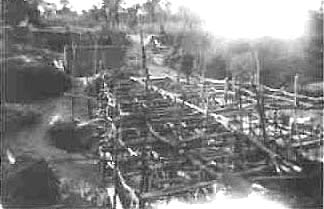Chapter 16 - Settling In
The next weeks were busy ones -
the men to the bridge site and Hilda and I setting up house. There was
always someone who could make what we wanted, by asking Unit to find us
someone who could make mats or stools or baskets, we had a constant supply
of callers only too anxious to help. First, we had grass mats made for
the dirt floors, the only difficulty there being when they had to be a
certain size, as their methods of measuring were most unreliable. They
would get a long grass or piece of lushishi and hold it across the space
to be measured, but very often at a slant, which threw the measurement
out. They were not used to rectangles, and preferred to work in circles.
We also had mats made to hang over the veranda to be rolled up in the
mornings and let down at night, also one for the door. That was our only
door, even to the bedrooms. Then we had the walls all whitened with pemba,
which was a lime available in the district for the digging.
One of our best matmakers was Mwangani Mwenso, who told us his name meant 'I see with the heart'. He arrived one morning wearing a brownish cloth around his loins and a felt hat and proceeded to climb about the veranda apparently measuring up for blinds. In spite of his garb, which was not fashionable at that time - all Africans aspired to khaki shorts and a shirt, even if the shirt consisted only of a few strands across the back. I have often seen them being taken off or put on with the utmost care to get all the strands in the right place, whereas to would have been much easier and more comfortable to wear no shirt - Mwangani Mwenso had a dignity and confidence quite unusual. He would have been in his forties then and had with him in the village belonging to our camp, a poor looking wife and son about fourteen. He had some English, but when first we met he gave the impression of always belonging to the bush and having had no contact with the white people. He was a little contemptuous of me at first -'a woman..and white at that' was his attitude, but he went off quietly with his measurements and made all the hanging mats for the veranda. He was to become a friend of mine in the future - witchdoctors together.
The bridge site was becoming as active as the building of the pyramids- a large pit had been dug for the sawyer, who was busy sawing across the pit, as much wood for shuttering that he could get. Labourers were gathering large bundles of poles for props and stacking them, others were collecting in baskets huge mounds of stone for the concrete, and much digging out of abutments was afoot, Alex had collected about two hundred men by this time and all but those who lived nearby had built their compound and brought in some wives and children, so there was much chattering and laughter, pounding of kasava root, washing clothes on the stones by the river, and gathering sticks for the evening fires.
We were awakened each morning by a drum - a lovely deep resonant drumming which ended with six spaced, even strikes, which told us the time. The drummer had no watch, and indeed ours had no means of a check as we had no radio, but the sun was his clock, and it became easy to judge the time to start and stop work. With the drumming, lying on my bed I could see on the horizon coming in single file with hoes or simbes on their shoulders, along the ridge of rock, the labourers from the further village, and we all sang 'heigh ho, heigh-ho, as off to work we go' and hurriedly dressed to get out in the fresh morning air. Eating our breakfast on the open veranda before the rains was a joy.

Simon had returned, but when we asked him why he hadn't brought his wife and five children, he said 'she would not agree'. As he was alone, he allowed Unit to share his kia, and they got on very well. It is very important if one has more than one servant in the house, to have those who are related or of the same tribe. I have known people with endless domestic upsets because of antagonistic boys, while each would have done very well on his own. Unit was a product of Bemba and Winamwanga, and suited Simon quite well. Simon told him what to do around the camp, and taught him how to make bread and other simple dishes, until it was not long before Unit advised us he was now a ' cook', but we were to get used to these self-promotions before long, our motto became 'blessed is he who expecteth nothing, for he shall not be disappointed'.